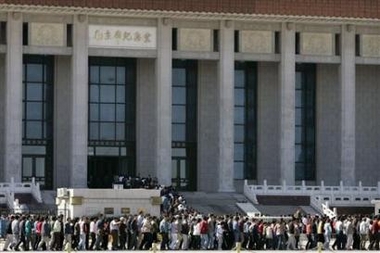For Dawa, a Zang ethnic minority and his family, the late Chairman Mao Zedong
is a legend and like a god to him, and someone, who he says, is worth thanking
from the bottom of his heart.
He told the Oriental Outlook magazine that his family members were jealous
about his visit to Beijing to see Chairman Mao as he queued up to pay his
respects to the late leader along with 20,000 tourists at the Memorial Hall for
Chairman Mao Zedong in the heart of the Tian'anmen Square.
However, the world's fourth-largest economy with an annual economic growth of
10.3 per cent is witnessing changes in the way people perceive Mao, who was once
painted as the savior of the most populous nation in the world.
Where before people carried Mao's red book with them as a source of
inspiration, now Chinese entrepreneurs are turning to Mao's warfare tactics to
earn profits.
Naobaijin, a popular tonic medicine sweeping across China, earned its profits
and fame from using the ideas behind Mao's 'countryside surrounding city' and
'mass warfare' tactics in its advertising and sales campaigns, Zhou Dajiang, the
author of Dang Shi Shang Jian, which turns Mao's tactics into business
transactions, told the magazine.
"Entrepreneurs turning to Mao for business management ideas indicate the
leader is a much more practical figure in people's minds. People have become
rational and show a sense of pragmatism," Renmin University School of Politics
deputy director Xiao Yanzhong noted.

Thousands of visitors queue
to view the embalmed body of the late Chairman Mao Zedong at his mausoleum in
Beijing September 9, 2006. Thousands queued at Beijing's Mao Zedong Mausoleum on
the 30th anniversary of his death. [Reuters]
But for China, which had gone through the agony of a civil war and the
Japanese invasion from 1937 to 1945, Mao's glory will never fade from the public
consciousness, even though people are becoming more practical in the way they
use his teachings. Mao is the leader who helped relieve the suffering of the
Chinese people.
A statue in Nanjie, a small village in central China's Henan Province is
imprinted with the phrase, 'Chairman Mao is not a god, but his thoughts are
better than god."
An abundance of flowers lying in front of Mao's statue and a crowd of 20,000
who come to see him each day proves his prevalence in a fast-changing China
thirty years after his death.
For China's elders who have experienced war and are now witnessing the
fasting-growing economy and a stunningly reborn China, Mao is a savior who
helped them out of an oppressive feudal system.
Jiang who missed his chance to pay respects to the late leader as the
Memorial Hall was closed on the day he came, brought his son and his gratitude
to Beijing.
"I come from generations of farmers. Without the help of our chairman,
we could not have changed things," Jiang says, adding that it is Mao's actions
in the past that helped his son to enter a Beijing university and get a job in
the capital.
Mao was born on December 26, 1893 in Shaoshan in Xiangtan County, in central
China's Hunan Province and grew up to lead the country in rebuilding a war-torn
China with an economy on the brink of bankruptcy.
Mao is well known to both Chinese and foreigners.
Clad in a Zhongshan uniform, representative of the Cultural Revolution period
and a pair of cloth shoes, 23-year-old Xiao Cui (alias) makes a living as a
ciceroni, telling overseas visitors about Mao.
"Chairman Mao was the representative of China. Foreigners want to visit him,"
the man says.
"Chairman Mao, good!" the 23-year-old told the Oriental Outlook in his clumsy
English.